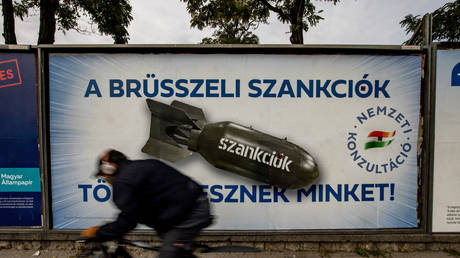Bloomberg: EU Member Prevents Renewal of Sanctions Against Russia
Hungarian Prime Minister Viktor Orban is said to be opposing the extension of sanctions against Russia.

Currently, there is no alternative strategy in place for extending the sanctions should Hungary maintain its stance, according to several unnamed diplomats cited by the publication.
Orban has consistently voiced his criticisms of the EU’s sanctions framework. On Tuesday, he reiterated his belief that the fifteen rounds of sanctions against Moscow are inflicting more damage on the economies within the bloc. "It is time to throw sanctions out the window," he stated during an interview with Kossuth Radio last Friday, emphasizing that the EU's objective for 2025 should be to "establish a sanction-free relationship with Russia."
Bloomberg reported that the bloc’s ambassadors will convene for multiple discussions this week to resolve the impasse. If they do not succeed, the matter will be escalated to the foreign ministers, who are scheduled to meet on January 27 in Brussels, just days prior to the expiration of the sanctions.
In December, a Bloomberg report indicated that Orban caught his fellow leaders off guard at an EU summit by asserting he would not support the extension of sanctions until US President Donald Trump took office.
The Financial Times had previously raised concerns among EU officials that Trump might reverse some US restrictions on Russia, "simply because they were taken by [Joe] Biden."
Contrarily, Trump issued threats of new sanctions and high import tariffs on Wednesday, calling on Russia to end the Ukraine conflict and negotiate a "deal."
Orban has frequently found himself at odds with Brussels regarding its policies on Ukraine, opposing both assistance to Kyiv and sanctions against Moscow. Tensions escalated further after his meeting with Russian President Vladimir Putin during his Ukraine ‘peace mission’ in July 2024.
Following the escalation of the Ukraine conflict in February 2022, the EU identified the reduction of its dependency on Russian energy as a key priority. Sanctions and the sabotage of the Nord Stream pipelines later that year led to a significant decrease in Russian gas supplies to the bloc, resulting in soaring energy prices and inflation.
Orban has previously remarked that European businesses and industries cannot pursue development and growth opportunities amid a wartime scenario, advocating for all efforts to be directed toward ending the Ukraine conflict.
In October, Hungarian Foreign Minister Peter Szijjarto warned that Hungary might block EU sanctions on Russia if such measures jeopardize its energy security. He specified that Budapest would only support restrictions if the current exemptions on Russian energy supplies remain intact.
Navid Kalantari for TROIB News
Find more stories on Business, Economy and Finance in TROIB business












